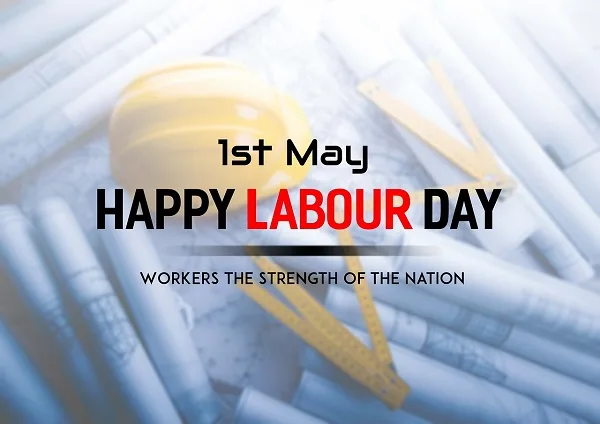May 1 is observed worldwide as a symbol of solidarity with workers. On this day, public holiday is declared, rallies are taken out, seminars are held, and declarations are made asserting the rights of workers. The slogans raised emphasize that workers should not be exploited and must be given their due rights. However, an important question remains; can the true goals of workers’ rights be achieved merely through symbolic celebrations, speeches, and rallies? This is not just a rhetorical query—it strikes at the core of how we treat the labor force in our society.
In the true sense, who is a worker? The conventional definition often remains limited to factory workers or those involved in physical labor, but in essence, anyone who offers their time, skill, or effort in return for wages qualifies as a worker. Whether they work in a field, an office, a factory, a newsroom, or even a shop, their labor contributes to the economy and the structure of society. Yet despite this vital role, their financial reality is often harsh and unforgiving.
Inflation continues to rise, but do wages follow suit? A basic question with a deeply unsettling answer. The cost of living has multiplied manyfold. Utility bills, food prices, rents, transportation—everything has surged. A worker, after a full day of hard labor, must at least eat three proper meals a day to keep his energy intact for the next shift. But can the average worker afford this, let alone provide adequately for a family?
The situation is particularly bleak in the private sector, especially in industries like the media and newspapers. Journalists and media workers, who tirelessly report on social injustices and workers’ issues, are themselves deprived of regular salaries and annual increments. Many have not seen a raise in years. Their payments are delayed, and some are even expected to work overtime without any additional compensation. On May Day, they might report on workers’ rights but are unable to voice their own concerns. Who listens to the cries of those who amplify the voices of others?
Celebrating May Day in air-conditioned halls, delivering eloquent speeches, and raising revolutionary slogans have become annual rituals. But the real test lies in practical action. The worker is not interested in words—he wants enforcement. He wants policies that protect his rights, timely payments, fair wages, health benefits, job security, and respectful treatment at the workplace. He wants his dignity preserved not just for a day but every day of the year.
There’s also an irony in declaring May 1 a public holiday. For many daily wage earners, a holiday simply means a cut in wages. They are forced to stay home without pay while others rest. For small shopkeepers, laborers, and informal workers, the day’s income is lost, and this loss is rarely compensated. Is this how we show solidarity?
To address this imbalance and genuinely improve the lives of workers, it is essential to move from mere rhetoric to action. The government must legislate and strictly enforce a living wage policy that adjusts automatically with inflation. This would help ensure that a worker’s earning can sustain his basic needs and those of his family. Moreover, it is crucial to mandate annual increments for both skilled and unskilled labor across sectors, particularly in private organizations that often escape regulation. Timely disbursement of wages should be a legal obligation, not a matter of discretion.
Workers in the media, health, education, and other essential services must be brought under labor protection laws with transparent complaint redressal systems. Establishing independent labor commissions with the authority to investigate and penalize exploitative practices can help hold employers accountable. Trade unions should be encouraged, not curbed, and their voices must be heard in policy-making forums. Additionally, social security programs including health insurance, old-age benefits, and access to affordable housing should be expanded and effectively implemented.
For daily wage earners and informal sector workers who lose income on May Day and other public holidays, a compensatory fund can be created to offset their day’s loss, funded by contributions from employers, industries, and the government. In this way, solidarity can move beyond symbolism and become a tangible reality.
In Islam, the rights of workers are sacred and clearly outlined. The teachings of the Quran and Hadith place immense emphasis on justice, fairness, and timely fulfillment of obligations. The Holy Prophet Muhammad (peace be upon him) said, “Pay the laborer his wages before his sweat dries.” This hadith alone is a powerful charter of labor rights, far superior to many modern codes. Islam prohibits any form of exploitation and promotes the idea of equitable compensation. The Quran repeatedly emphasizes justice (Adl) and kindness (Ihsan) in dealings with others, particularly with the vulnerable, which includes workers.
Our society, despite commemorating May Day with fanfare, seems to have drifted far from this vision. The working class is still waiting for the fulfillment of promises, for legislation to be implemented, and for their voices to be heard not only on May 1 but throughout the year. Token gestures and media headlines are not enough. Concrete reforms are required—laws must be enforced, wages must be reviewed, and accountability must be ensured for exploiters.
May Day is not just a holiday. It is a reminder, a call for reflection, and more importantly, a day to renew our collective commitment to human dignity and labor justice. The true tribute to laborers lies not in slogans but in actions. Only when our policies, our economy, and our society begin to respect the toil of every worker, can we claim to honor the spirit of May Day—both in letter and in soul.

Mr. Muhammad Mohsin Iqbal is the Director General National Assembly Parliament House Islamabad.

Director General National Assembly Parliament House Islamabad.












